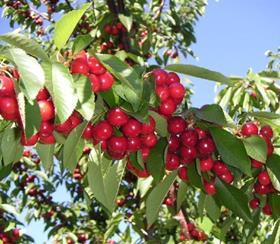
Initial indications suggest abnormal winter weather has exacted a toll on this season’s Californian cherry crop.
The US state is struggling through its third year of extreme drought, with growers in the San Joaquin Valley, a hub for cherry production, being notified their irrigation allocations will be drastically reduced this summer. Adding to the San Joaquin’s travails was a hard freeze that lasted nearly all of December, followed by spring-like conditions in January and February that failed to produce the chilling valley fog growers count on to put fruit trees and vines into dormancy.
Leading up to harvest, cherry growers were reporting very light fruit sets in southern orchards located between Bakersfield to Fresno. The northern Bing crop, centered in the Stockton-Lodi, also appears to be a concern, with early reports suggest the fruit set appears to be erratic.
“The bloom has been all over the board this year – not uniform at all,” said Jim Hansen of Grower Direct Marketing. “Walking the groves, you can see cherries set on one side of the tree with bloom still going on the other side. I’m thinking we’ll only have a moderate Bing crop this year at best.”
According to the California Cherry Commission, 3.2m cartons of cherries shipped from the San Joaquin district in 2013. Given the evidence in the orchards, some industry observers feel the southern region may be hard pressed to ship 2m cartons in total this year.
California cherry industry shipments have averaged nearly 8m cartons over the last seven seasons but could fall to 5m cartons this year if some of the early predictions prove accurate. Timing also appears to be irregular. “This will be one of the earliest starts to a season ever,” Maurice Cameron of Flavor Tree Fruit Company said.
When the first fruit of the season is hydro-cooled and packed, Japan will likely be the first international destination shipped. The island nation remains the Californian industry’s largest offshore market, with exports totalling upwards of 615,300 cartons in 2013.South Korea has emerged as California’s second largest international market, importing nearly 543,000 cartons in 2013, while the combined China/Hong Kong market received just under 348,000 cartons last year.



